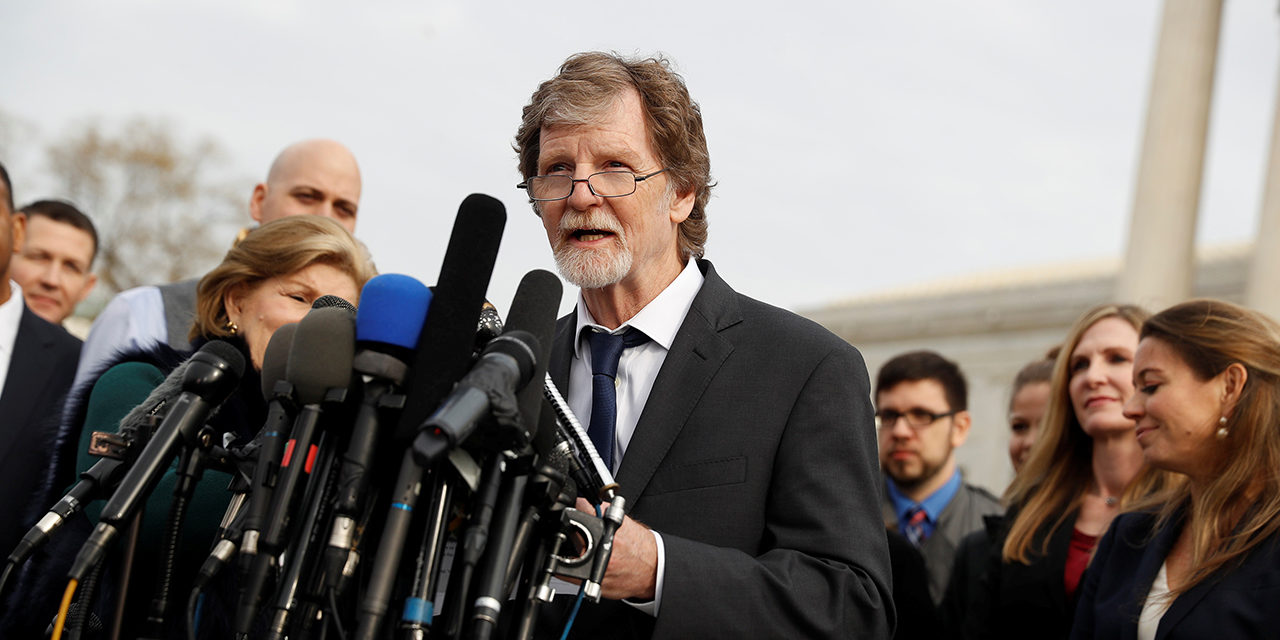Jack Phillips, the owner of Masterpiece Cakeshop in Lakewood, Colorado, has already been to the U.S. Supreme Court once for refusing, on conscience grounds, to create a custom wedding cake for a same-sex couple in 2012. He won that case in 2018.
But in June 2017, the same month the Supreme Court agreed to hear Jack’s case, a Denver attorney who was born a male but identifies as a female called Jack’s shop, after reading the publicity surrounding the case, to order a pink and blue cake in order to celebrate his “transition” from male to female. Jack declined. The attorney, who now goes by the name Autumn Scardina, filed a complaint with the Colorado Civil Rights Commission alleging that Jack violated the Colorado Anti-Discrimination Act.
When the Commission, whose open hostility toward Jack’s religious faith prompted a scathing rebuke from the justices in their 2018 decision, bowed out of prosecuting Jack in Scardina’s case, the activist attorney filed his own lawsuit, which went to trial before Denver District Court Judge A. Bruce Jones in March.
The court’s decision, dated June 15, rejects Jack’s defense that Scardina’s request would prompt him to have to violate his conscience and create a cake with a message he disagreed with.
The judge first found that Jack, who regularly sells his products to LGBT individuals, refused to bake the blue and pink cake simply because Scardina is a transgender individual. When Scardina first spoke to Jack’s wife about a blue and pink cake, he didn’t mention why he wanted those colors until after she said they could make such a cake.
Then Scardina closed the trap by announcing that the colors he wanted in the cake represented his transgender status, and Jack’s wife told Scardina at that point that they probably couldn’t bake the cake because of its message.
Judge Jones inexplicably concluded that the refusal at that point to create the requested cake had to do with Scardina’s transgender status, not the message. But if Scardina had introduced himself as a transgender individual, and merely requested a blue and pink cake without specifying the message contained in the cake, I’m certain, based on my own interview of Jack recently and what I know of the history of his previous litigation, that he would gladly have baked that cake.
The Denver judge didn’t address that particular issue. And, by the way, Judge Jones refers to Scardina as “Ms.” Scardina throughout his opinion.
Judge Jones also rejected the argument that a cake such as the one Scardina requested could be considered “speech” protected by the First Amendment as well as the Colorado Constitution.
“Mr. Phillips may often use artistic techniques and tools to create baked goods,” Jones wrote. “However, the fact that goods or services may involve some level of artistry or skill does not transform all such goods into ‘expressive speech.’… Based on the evidence presented, the Court concludes that Defendants were not requested by Ms. Scardina to engage in self-expression.”
The issue of Jack’s free speech rights was raised in his Supreme Court case, but the justices avoided answering that question, and instead decided in his favor based on the Colorado Civil Rights Commission’s hostility toward his religion.
In this third attempt to harass Jack and relegate speech and conscience to second-class status, Jack’s lawyers at Alliance Defending Freedom have already announced their intent to appeal Judge Jones’ decision to the Colorado Court of Appeals. Jones imposed the maximum fine allowable under the Colorado statute: $500.
“Jack Phillips serves all people but shouldn’t be forced to create custom cakes with messages that violate his conscience,” ADF General Counsel Kristen Waggoner said in a press release. “In this case, an activist attorney demanded Jack create custom cakes in order to ‘test’ Jack and ‘correct the errors’ of his thinking, and the activist even threatened to sue Jack again if the case is dismissed for any reason. Radical activists and government officials are targeting artists like Jack because they won’t promote messages on marriage and sexuality that violate their core convictions.
“This case and others—including the case of floral artist Barronelle Stutzman, whose petition is pending before the U.S. Supreme Court—represents a disturbing trend: the weaponization of our justice system to ruin those with whom the activists disagree. The harassment of people like Jack and Barronelle has been occurring for nearly a decade and must stop. We will appeal this decision and continue to defend the freedom of all Americans to peacefully live and work according to their deeply held beliefs without fear of punishment.”
The Daily Citizen will be following this case as the appeal proceeds, and we will post regular updates.
Photo from AARON P. BERNSTEIN/REUTERS






